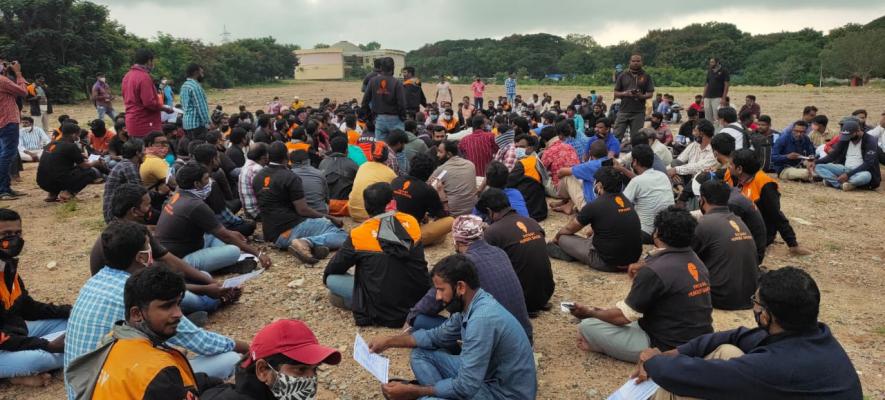Striking for More Wages, Swiggy Workers Champion Collective Care

Little else matters when one can’t put food on the table – even more so when penury persists despite back-breaking labour which sometimes lasts for up to15 hours on some days.
The struggle was not unknown to Rakesh (name changed), a Noida-based rider at food delivery unicorn Swiggy. The COVID-19 crisis only compounded his vulnerabilities: rent payment, school fees for his children and other liabilities which persisted and his meagre income could not meet them.
Even during the time when he needed it the most, there was no hope of a helping hand by the company, he told NewsClick. It is when Rakesh’s co-riders came forward and “took care” of his immediate household finances.
“They collected about Rs. 20,000 between them and gave it to me. There were no questions asked and no assurances of returning it in the future,” Rakesh said. “We all only knew each other as ‘Swiggy boys’, and yet they helped me,” he added.
The gesture came about at an ongoing strike of Swiggy delivery executives in Noida. On Friday, nearly 1,600 workers abstained from logging onto the app, 21-year-old Satyender Yadav, another delivery partner with Swiggy, informed NewsClick.
The workers have been protesting against Swiggy’s new wage rates which were introduced in early August this year. The money they make by delivering each order, which forms a major source of their cumulative income, was allegedly scaled down.
“My monthly income, which was around Rs. 20,000 during pre-COVID-19 times has now come down to only between Rs 5000 and Rs 6000 after the cuts. I get this much only after having completed my daily target which is also so high that I work for more than 15 hours in a single day,” Yadav said.
However, fighting for more wages is bound to be difficult, especially when any action taken by the delivery executives may result in matters turning for the worse – their IDs getting blocked, which would then lead to them losing their daily earnings, however meagre they are.
It is what we thought, hence we decided that we have to organise and take care of each other, said 31-year-old Shubham Kumar, a delivery executive in Noida. “We started arranging groceries for those whose family are in need of it and covered the house rent for some,” he added. “Money was always collected from all of us. There is no minimum contribution. Help as much as you can afford,” he said.
Distrustful of the company, the idea to engage in collective care also helped in staging a sustained campaign for better wages, social protection, and above all, being treated as employees and not independent partners. It is so in Hyderabad, where an indefinite strike of delivery executives associated with Swiggy has entered its fourth day on Friday. It continues to witness the participation of almost 3,000 workers.
Shaikh Salauddin, the national general secretary of the Hyderabad-based Indian Federation of App-based Transport Workers (IFAT), said that there is need to join hands, not just while taking a political decision but also in economic matters. He said it was a key takeaway from previous strikes. “Everybody knew that all (delivery executives) are going through similar financial strains. Coming together to fight difficulties also helped some in gaining confidence,” he told NewsClick.
It also meant that the often-associated risks with strikes like penalising a delivery boy, an occurrence which Salauddin termed a “common practice of Swiggy across the cities”, were minimised.
Collectives are also finding their place among restaurateurs. “This time around, more than 80 big restaurants here opted to not accept orders from Swiggy,” said Salauddin, who spoke from Hyderabad.
This, however, is the not the case in Noida, where groups of delivery executives in orange and black Swiggy uniforms are seen outside popular restaurants.
“We will continue to protest until our demands are not met,” said Yadav, who is also a member of the Delhi NCR-based All India Gig Workers Union (AIGWU). The body was formed only in August this year, in the wake of protests by Swiggy workers that had spread in at least three major metropolitan cities – Delhi, Chennai and Hyderabad.
Back then, Swiggy had responded to NewsClick’s queries and said that their revised service fee continues to be the “best-in-the-industry”. “We understand the efforts put in by our delivery partners in making Swiggy accessible to consumers and maintain an honest approach in enabling a sustainable service fee,” the email response had said.
Their words proved ineffectual in appeasing the irked workers. As a result, in parts of Noida and Hyderabad, a message reportedly continued to greet customers on the Swiggy app: “High demand. Additional ₹15 delivery fee will be applicable.”
Get the latest reports & analysis with people's perspective on Protests, movements & deep analytical videos, discussions of the current affairs in your Telegram app. Subscribe to NewsClick's Telegram channel & get Real-Time updates on stories, as they get published on our website.
























